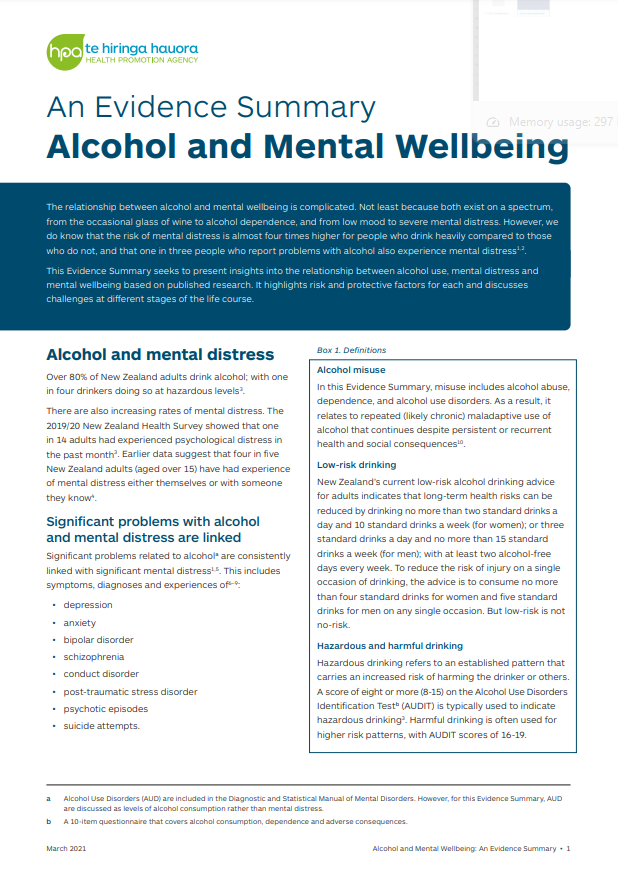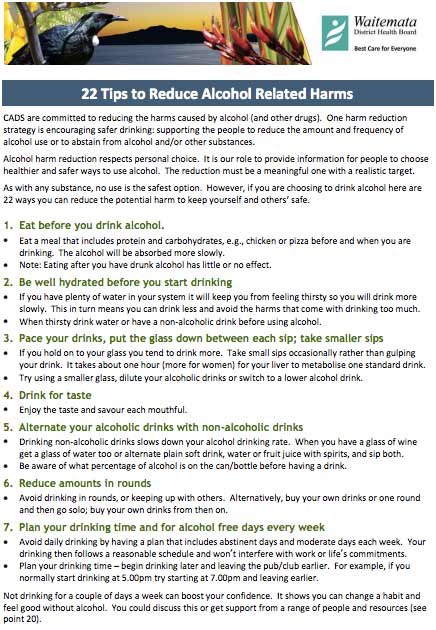You can now add Healthify as a preferred source on Google. Click here to see us when you search Google.
Alcohol and mental health
Key points about alcohol and mental health
- Alcohol affects your body and your brain.
- It can initially act as a stimulant that induces feelings of euphoria and talkativeness, which is why it is so popular in social settings and as a pick me up when feeling stressed or low.
- However, alcohol is classified as a depressant. It disrupts the balance of chemicals in the brain, including serotonin – a chemical that helps to regulate your mood. This is why if you drink too much or too often you can end up feeling worse – it can increase your anxiety as the effects wear off.
- If you use alcohol as a way of relieving stress and anxiety, there is a risk that you may become dependent on it.
- There are lots of other strategies you can use to improve your mood.

Video: Alcohol and mental health
(Drink Aware UK, 2021)
Alcohol can affect all parts of your body, including your brain and your brain chemistry. Your brain functions best when its chemicals and processes are in balance. Alcohol disrupts that balance. It changes the neurotransmitters, which are the chemicals that help transmit signals from one nerve (or neuron) to another.
The relaxed feeling you get when you have your first drink is the sign that your brain chemistry is starting to change. The alcohol is depressing the part of the brain associated with inhibition, so you may feel more confident and less anxious.
Drinking also lowers the levels of serotonin in your brain – a chemical that helps to regulate your mood. When this happens, negative emotional responses, such as anger, aggression, anxiety or depression, can start to take over.
This not only happens each time you drink, but it can also have an accumulative effect so that if you drink regularly, your serotonin levels get lower and lower. Rather than improving your mood, alcohol can gradually make it worse.
The relationship between alcohol and mental health is complex. Alcohol can negatively affect your mood and mental wellbeing, your mental state can affect your use of alcohol and it may be that other factors affect both your drinking behaviour and your mental health and wellbeing.
Anxiety and depression are more common in heavy drinkers and heavy drinking is more common in those with anxiety and depression. Alcohol is a major risk factor for suicide ideation, suicide attempt and complete suicide. Over a third of people who have completed suicides in Aotearoa New Zealand had also consumed alcohol.
Alcohol can make mental health conditions worse
If you experience mental health issues, you might find you use alcohol to temporarily feel better. Drinking alcohol is sometimes used to cope, or as a coping strategy. You can find yourself gradually drinking more alcohol, more often.
However, because of how it changes your brain chemistry, alcohol can contribute to and worsen symptoms of depression, anxiety, stress, mood disorders, suicidality, self-harm and psychosis. Also, because it removes inhibitions and increases recklessness, it can also put you more at risk of harming yourself, your whānau and others around you.
Alcohol can also interact with any medication you are taking for mental health or other conditions. It may be important not to drink alcohol at all, or to limit your intake if you are taking certain medicines. Check the instructions you were given when your medicines were prescribed, or ask your doctor or pharmacist if you are not sure.
If you have a mental health condition and you use alcohol as a coping strategy, talk about it with your healthcare provider.
Alcohol can contribute to developing a mental health condition and other problems
- Alcohol contributes to many diseases, conditions, injuries and events that may cause harm to yourself or to others. This can have mental health implications.
- If you drink heavily and regularly you’re likely to develop some symptoms of depression. This is because of the lowered production of serotonin in your brain.
- For some people, alcohol creates rather than reduces stress by stimulating your stress hormones.
If you don’t have a mental health condition but are concerned your drinking is slowly depressing your mood or increasing your stress, you can lower your risk of harm and take charge of your drinking by using the strategies described on the alcohol overview page which also provides maximum alcohol recommendations.
Video: Alcohol and mental health
This video may take a few moments to load.
(Drink Aware, UK, 2020)
Develop regular habits that reduce the build-up of stress and tension, such as:
- daily exercise, eg, walking, swimming, cycling, participating in sports
- yoga, tai chi or breathing exercises
- practising mindfulness
- meditation
- spending time with friends, whānau, church communities
- volunteering
- taking part in community events
- joining a club
- spending time in the bush or at the beach
- having a hobby or leisure activity that helps you forget about stressful things in your life
- if you are worried about something, talking to a friend, family member or finding a counsellor.

Image credit: 123RF
- If it is a crisis call 111, otherwise contact your healthcare provider.
- For help with your drinking, call the Alcohol Drug Helpline on 0800 787 797, visit alcoholdrughelp.org.nz(external link)(external link) or free txt 8681.
- For help with a mental health issue, phone or text 1737 for a trained mental health professional. 1737 is free to call or text from any landline or mobile phone, 24 hours a day, 7 days a week.
What support is available if I am affected by somebody else's drinking?
Help for families, whānau, friends(external link)(external link) Health New Zealand | Te Whatu Ora
Family Drug Support(external link)(external link) 0800 337 877 9am–10pm, 7 days a week
Apps reviewed by Healthify
You may find it useful to look at some Alcohol use apps and Mental health and wellbeing apps.
Alcohol(external link) Mental Wealth, NZ
alcohol.org.nz(external link)
Alcohol and depression(external link) Royal College of Psychiatrists, UK, 2015
Online NZ support to strengthen wellbeing
Ignite(external link) NZ
Alcohol and other drug support services
Alcohol and your body(external link)
Brochures
Alcohol and Mental Wellbeing (external link)Health Promotion Agency, NZ, 2021
22 tips to reduce alcohol related harms (external link)Community Alcohol and Drug Services, NZ, 2015
Apps
Alcohol use apps
Mental health and wellbeing apps
References
- Effects on the body(external link)(external link) alcohol.org, NZ
- Alcohol misuse – how to help patients in primary care(external link) Best Practice Journal, NZ, May 2016
- Deaths and other harm from alcohol(external link) ActionPoint, NZ, 2017
Key practice point
Check alcohol use in patients with depression, anxiety and other mental illnesses to assess whether it is causing mood disorders or exacerbating an underlying mental health condition. Addressing the use of alcohol may resolve some depression and anxiety.
Clinical resources
An evidence summary – alcohol and mental wellbeing(external link) [PDF, 695 KB] Health Promotion Agency, NZ, 2021
Alcohol misuse – how to help patients in primary care(external link)(external link)(external link) BPAC, NZ, 2016
Mental Health Issues: Alcohol Use Disorder and Common Co-occurring Conditions(external link) National Institute on Alcohol Abuse and Alcoholism, US

Health Promotion Agency, NZ, 2021

Community Alcohol and Drug Services, NZ, 2015
Credits: Healthify Editorial Team
Reviewed by: Luisa Silailai, Programme Manager for Alcohol Harm Minimisation and accredited DAPAANZ Clinical Supervisor/Alcohol and other Drugs and Problem Gambling Clinician.
Last reviewed:
Page last updated:





